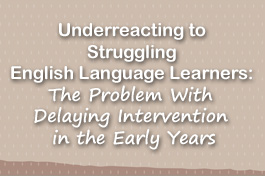

by Nonie Lesaux and Joan G. Kelley
Harvard Graduate School of Education
June 4, 2014
In Mr. Nardone’s 1st grade class, Thanh struggles to read aloud from the Three Little Pigs script while practicing for the end-of-year class production. “He still has a lot of trouble sounding out English words he knows,” Mr. Nardone thinks to himself. “I know he was born in the U.S. and went to the neighborhood preschool, but he's still negotiating two languages. That has to make early reading harder, but surely it will get easier as time goes by.”
 Diagnosing reading difficulties is a nuanced process. For example, educators have to discern whether students struggle with skills-based competencies (at the word level) and/or whether they are having problems with the knowledge-based competencies (e.g., vocabulary, conceptual understanding) that are necessary to comprehend text. When teaching English Language Learners (ELLs), the process can be even more complicated, and today’s prevailing response presents a dilemma.
Diagnosing reading difficulties is a nuanced process. For example, educators have to discern whether students struggle with skills-based competencies (at the word level) and/or whether they are having problems with the knowledge-based competencies (e.g., vocabulary, conceptual understanding) that are necessary to comprehend text. When teaching English Language Learners (ELLs), the process can be even more complicated, and today’s prevailing response presents a dilemma.
We know that many ELLs have a long way to go to develop grade-level literacy skills—after all, they have the dual challenge of both developing English and learning to read in a language in which they are not yet proficient. Often, when serving young ELLs who are struggling to “crack the code,” schools and teachers wrestle with an essential question: Is the early reading acquisition problem due to the child’s developing proficiency in English, or is there some underlying reading or language difficulty that goes beyond the student’s natural struggle to learn this new language?
We make a mistake when we spend much time wrestling with whether to remediate or not, or when we decide that reading will come along when English language proficiency does. In fact, many ELLs do not receive the early, targeted intervention that their struggling classmates receive. But research tells us that when it comes to skills-based competencies—those associated with cracking the code—young ELLs can achieve at a level consistent with their English-only speaking classmates (Chiappe, Siegel, & Wade-Woolley, 2002; Lesaux & Siegel, 2003; Limbos & Geva, 2001; Samson & Lesaux, 2009), and therefore should be supported as readily as their native English-speaking peers. Instead, many well-intentioned teachers wait until their ELLs become more fluent and more facile with English before recommending them for code-based support services. This relatively common practice inadvertently works against the ELLs’ reading progress when the children need additional, targeted support to develop their phonological awareness and word-level level reading skills.
In the end, here’s today’s dilemma: Recent studies confirm that ELLs are less often identified as needing specialized support in kindergarten and first grade, and thus they are not signed on for support services. For example, in a study conducted with a nationally representative sample, the data shows that only 4% of kindergarten-age ELLs were receiving special education services—a proportion that is significantly less than the proportion of ELLs in the total population and is significantly less than the proportion of English-only students identified for special education services (5.5%). However, by third grade, the proportion of ELLs identified for special education services increased by 305%, compared with an increase of 132% for English-only students. In other words, although starting out underrepresented, by third grade ELLs were over-represented in the special education population. Research and clinical experience show that with early identification of ELLs’ underlying language and/or reading difficulties, the support needs will not mushroom in the late elementary years.
When educators hear oral language inconsistencies from students, blaming English reading-skill difficulties on English language-learning issues is hardly surprising, but with a better understanding of the research, we would see the two as distinct. Fortunately, we are encouraged by the introduction of the Response-to-Intervention (RTI) model in many schools across the country, which should help change this inadequate approach and allow every ELL—whether struggling with code-based, or meaning-based competencies, or both—to receive timely and appropriate instructional supports.
Chiappe, P., Siegel, L. S., & Wade-Woolley, L. (2002). Linguistic diversity and the development of reading skills: A longitudinal study. Scientific Studies of Reading, 6(4), 369-400.
Lesaux, N. K., & Siegel, L. S. (2003). The development of reading in children who speak English as a second language. Developmental psychology, 39(6), 1005.
Limbos, M. M., & Geva, E. (2001). Accuracy of teacher assessments of second-language students at risk for reading disability. Journal of learning disabilities, 34(2), 136-151.
Samson, J. F., & Lesaux, N. K. (2009). Language-Minority Learners in Special Education Rates and Predictors of Identification for Services. Journal of learning disabilities, 42(2), 148-162.
Nonie Lesaux is a member of the International Reading Association’s Literacy Research Panel. Reader response is welcomed. E-mail your comments to LRP@/.